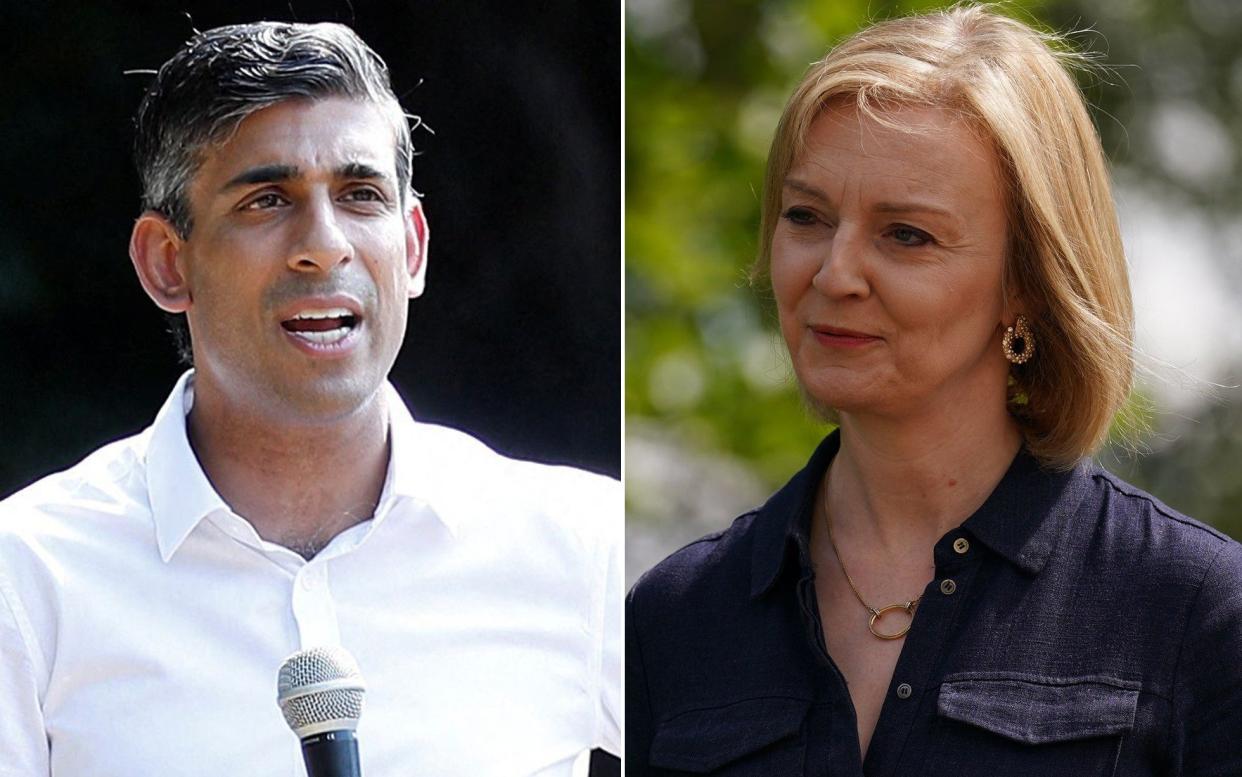How emergency tax cuts could save households hundreds of pounds

Tory leadership candidates Liz Truss and Rishi Sunak are coming under pressure to explain how they will help Britain navigate its spiralling cost of living crisis.
With inflation expected to pass 13pc by the end of the year and another increase in the energy price cap looming in October, families are bracing for more financial pain.
Both Ms Truss and Mr Sunak are promoting new policies to win over their party voters – but the pair have clashed over the timing and extent of potential tax cuts and other financial support packages. The Telegraph looks at the options on the table, and how much households could save.
Income tax cuts
Mr Sunak has promised a 20pc tax drop for millions of workers if he becomes Prime Minister – but it would only apply to those who earn less than £50,000.
The former chancellor said he would lower the basic-rate of income tax from 20p in the pound to 16p by the end of the next Parliament in 2029, in what would be the biggest cut to the levy in 30 years.
For a worker earning the average salary of £32,000, the cut would mean paying 20pc less income tax, a saving of £777 a year. Someone earning £50,000 a year would also pay a fifth less tax, saving £1,497.
The promised tax cut has stirred support for Mr Sunak, with estimates that it could save taxpayers £19bn a year. But with a seven-year timeline, it will be too far-off to help households this winter.
National Insurance reversal
Ms Truss has not announced a policy on income tax, but she has promised to reverse the 1.25 percentage point rise in National Insurance which came into force at the start of this tax year. She has claimed the move, which would save taxpayers £13bn a year, would offer immediate relief to households.
However, Mr Sunak has said that not only will this policy take more time to implement, it will also not “touch the sides” for struggling families. Scrapping the health and social care levy will give an average worker around £170, he said, while someone on the National Living Wage will get less than £60.
Cutting taxes on energy bills
The price cap on energy bills could reach £3,687 in October – close to double current levels – and about £4,400 in January, according to the energy consultancy Auxilione.
The Government makes energy companies add an environmental and social cost on energy bills, which is then directed to fund renewable energy schemes and provide insulation grants.
In order to tackle rising bills, Ms Truss has said she would temporarily suspend this “green levy”. She claims that this would take “around £150” off energy bills, creating a total saving of £8.5bn a year.
However, it is worth noting that Ms Truss has already committed to the Government’s net zero target. While she has said that “we need to reach net zero in a way that doesn’t harm businesses or consumers”, she would have to find another way to fund these projects.
Meanwhile, Mr Sunak has promised to temporarily scrap 5pc VAT on energy bills, if, as expected, the price cap rises above £3,000 in October.
The IFS has said that this would save a typical consumer £154 a year, and save taxpayers about £4.3bn.
It would reduce a typical household energy bill by 5pc – but by October, bills are expected to have more than doubled against last year. A 5pc reduction may not be enough to help the poorest households, who are least able to cope with rising costs.
The IFS has also warned it could prove politically difficult to restore VAT on energy bills. Stuart Adam, of the think tank, said a permanent policy would be a “move in the wrong direction”, distorting households towards more energy use and making it harder to reach net zero targets.
Energy bill subsidies
The Government has already announced an energy bill rebate that will provide a £400 discount on bills in October for every household. However, this policy was designed when the forecast for the October price cap was £2,800 – it now stands at £3,687.
Neither candidate has committed to any change in the rebate, but the National Institute for Economic Research has called for an increase in the grant from £400 to £600 as energy costs continue to march upwards. However, these payouts would ultimately need to be funded by the taxpayer.

 Yahoo Movies
Yahoo Movies 
